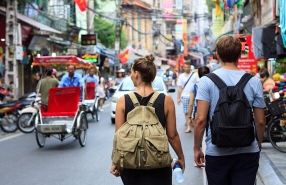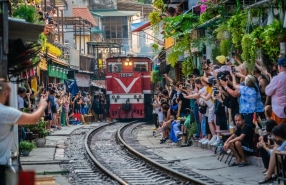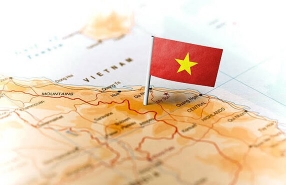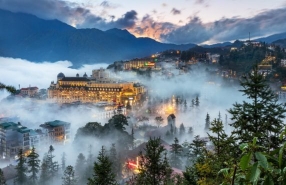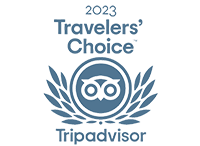What To Do In Hue When It Rains ? Travel Tips By Lucien

Hello everyone ! I am Lucien — passionate about history, architecture, and those journeys that leave a lasting impression. During my trip to Hue Vietnam, I discovered an imperial city full of charm, where the golden ramparts and peaceful gardens seem suspended in time. Then the rain arrived… fine, constant, almost hypnotic. Far from darkening my stay, it revealed a more intimate and poetic face of Hue, between mystery and serenity. Thanks to Autour Asia, a local travel agency in Vietnam, I was able to explore the city without stress, even under the showers. In this article, I share with you my personal experience and my tips to know what to do in Hue when it rains, and why discovering it in the rain makes the trip even more unforgettable.
Table of Contents
I. Why choose to visit Hue even in the rain ?
Hue in the rainy season extends from September to April and gives the city a completely different appearance. The sky is covered, minor rainfalls are scattered and interrupted as if to better allow a luminous and golden light to pass. The air is a bit cooler at about 20°C, and landscapes get a silver veil: the roofs of the imperial city shine under water, pagodas vanish in the haze, and the Perfume River softly weaves through the green hills. It's a tranquil, slightly melancholic period, when nature and the monuments exhale in unison.
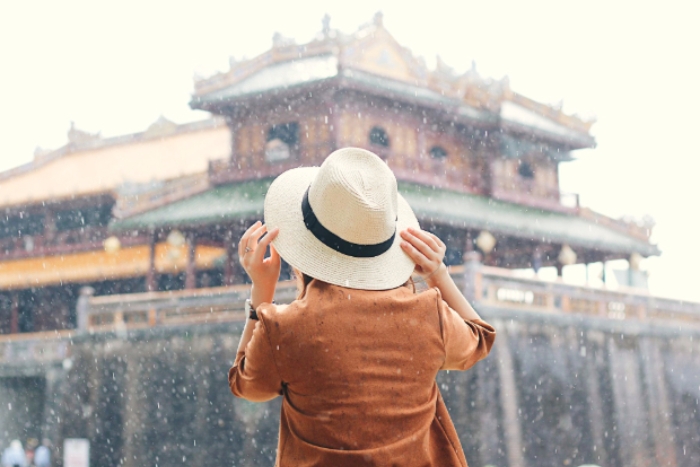
Visit Hue in the rainy season is therefore a unique experience. There is no crowd, prices are more affordable and everything seems a bit more real, a bit more sincere. I like to walk slowly through the damp alleys of the Citadel, listen to the wind slide over the tiles of the pagodas’ roofs, or simply watch the city stop under a shower. What many consider a constraint becomes, in my eyes, a small luxury that allows one to discover Hue in a different light: a softer, more poetic, more soothing face.
II. What to do in Hue when it rains ?
1. Discovery of the Imperial City of Hue
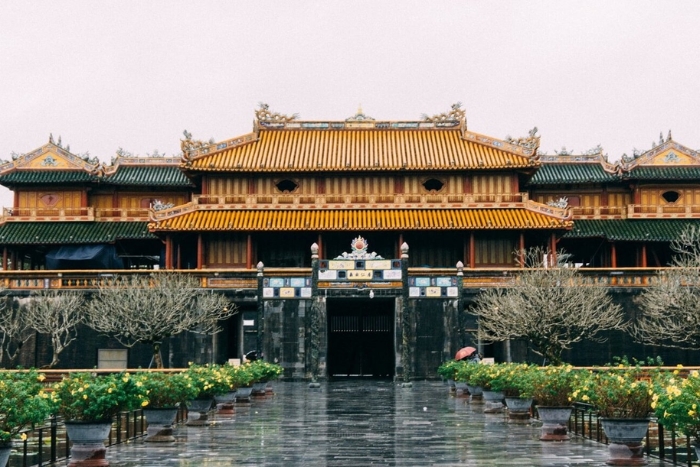
Under the rain, the old Imperial City of Hue shows its still and peaceful beauty. Through the Noon Gate (Ngọ Môn), I was greeted by golden pavilions and corridors illuminated by mellow light. The mist enhances the view with a calm and meditative aura, a boon for anyone at a loss for what to do in Hue when it rains. You can also walk along the galleries in any weather and see the carved dragons, pause in front of the pond full of lotus flowers or visit the rooms that house the royal costumes and imperial objects.
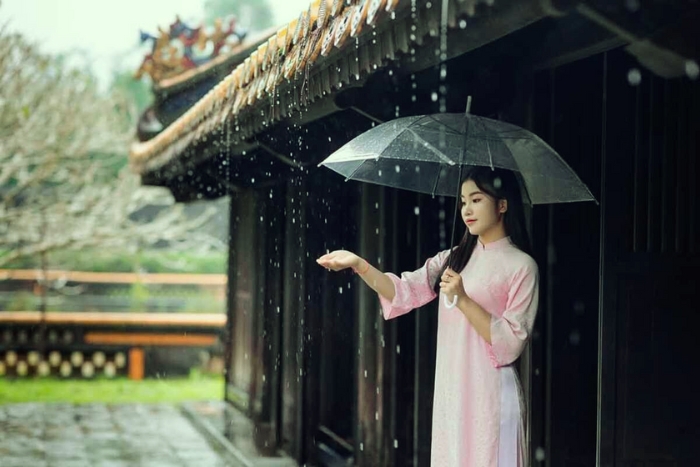
In the Palace of Supreme Harmony, the throne, the lacquered columns and other precious decorations recall the splendor of the Nguyen. Everything is alive, let it rain whatever you want, the colors, the reflections, the sounds. Before leaving, I lingered to look at the reflections of the Noon Gate on the water — a simple scene, but of striking beauty, which sums up on its own the melancholic elegance of Hue.
2. Immersion in the royal tombs of Hue
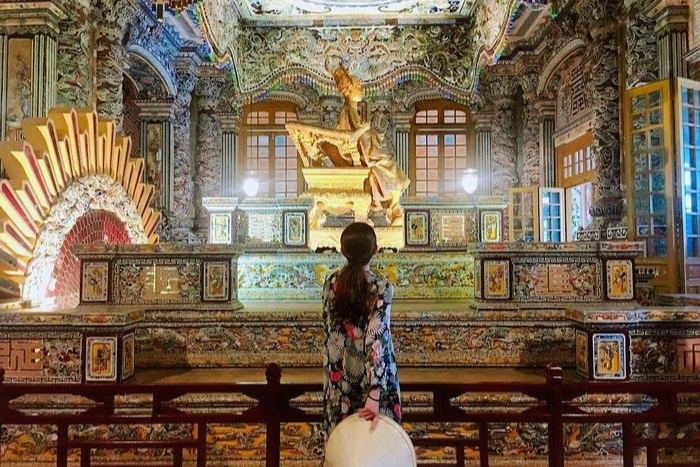
Visiting the royal tombs of Hue in the rain is a small bath of frozen time, one of the activities to do in Hue in the rainy season to feel all the majesty of the past. The setting becomes more mysterious right from the entrance: the hills are veiled with a few mists, the ponds are covered with circles of water at each drop, and silence settles. At the tomb of Khai Dinh, black stone and multicolored mosaics play silver reflections. I slowly climb the slippery steps, admiring the mandarin statues lined up as if frozen in the rain. Inside, the diffused light highlights the details of the golden ceiling; each motif seems to recount the grandeur of a vanished empire.
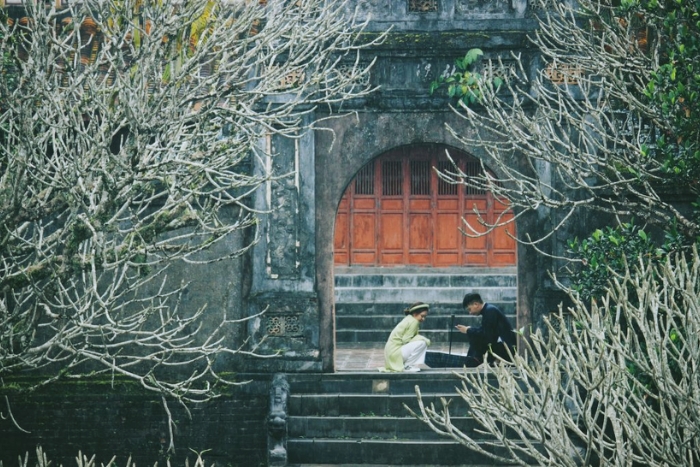
A little further, the tomb of Tu Duc welcomes me in a more subdued atmosphere. The garden, the pines and the pavilions fade into the fog. The water ripples under the drops on the lake, and everything looks so peaceful. I hurried slowly while enjoying this unexpected tranquility, a precious sensation for those wondering what to do in Hue when it rains. Then comes Minh Mang, majestic and symmetrical, where the perfection of the shapes is reflected in the ponds. Under the rain, everything is clearer, deeper. These tombs, instead of losing their beauty, transform it: they become places of contemplation, of poetry and of silence, where one fully feels the imperial soul of Hue.
3. Cultural break in the museums of Hue

When the rain covered Hue with a silver veil, the museums became the perfect refuges, among the best activities to do in Hue to fully enjoy its peaceful atmosphere. I liked to shelter there, an umbrella still wet in my hand, and felt the warmth of the old wood after the cold outside. The Museum of Royal Antiquities was without doubt one of the most captivating. Each object told of the finesse and refinement of life at the Nguyen court. The imperial costumes, the weapons, the ceremonial accessories… everything still seemed imbued with the breath of history. Outside, the rain fell without stopping, but inside, time stopped, and the murmur of the past became almost soothing.
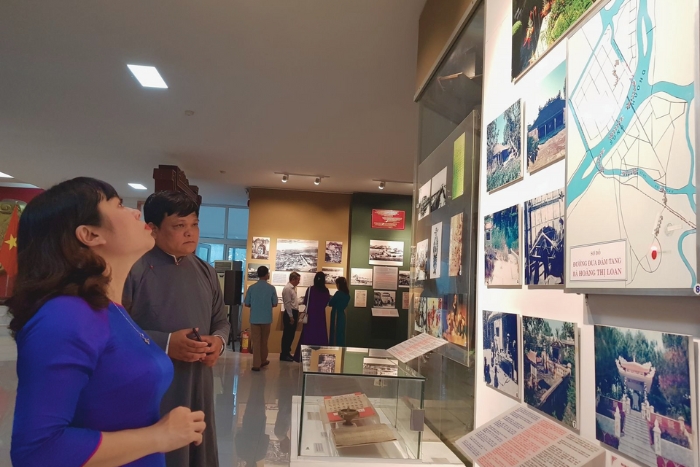
I continued my visit at the Ho Chi Minh Museum in Hue, set up in an old building with a simple and luminous architecture. This discreet place invites one to discover the childhood years of the famous Vietnamese leader in Hue, through carefully preserved documents and period objects, a fine option for those wondering what to visit in Hue on rainy days. When I came out, the cobblestones shine, the rain has calmed, and Hue regains its quietness. These museums are not only shelters for grey days — they are spaces of memory, where beauty and history answer each other in silence.
4. Experience of Nhã nhạc – Royal music of Hue
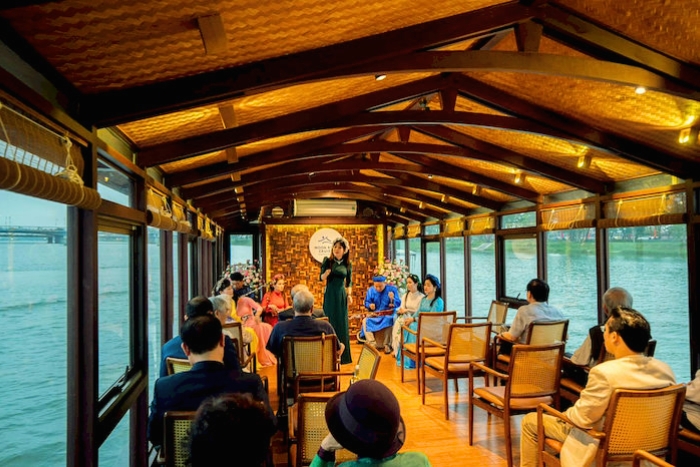
One wet evening, I succumbed to the allure of a Nhã nhạc performance, the royal music of Hue recognized by UNESCO as intangible heritage, which is among the best answers to the question what to do in Hue during the rainy season. From out on a boat slowly gliding down the Perfume River, the silence of the night was broken by the sounds of drums and lutes. Wrapped in silk robes of striking colors, the performers played their pieces with a solemn elegance that evoked the splendor of imperial ceremonies of old. In the humid atmosphere, the sounds undulated and mixed with the rainfall and with the lights that swayed from the lanterns floating downstream on the river. Everything was peaceful and it was almost surreal. I thought I had brushed — even if for just a second — the soul of Hue: pretty, sad and poetically strong.
5. Escape into the craft villages of Hue

Hue in the rainy season gives rise to these desires to take refuge in small workshops where time seems to have frozen. In the incense village of Thuy Xuan, I discovered the craft of making colored incense sticks. The atmosphere stretched out under a roof of corrugated-sheet style, scented with spices and woods. The artisans shaped each stick little by little, with infinite patience, and the repetitive and precise movements of their hands seemed to create a silent music. I tried in my turn, not well, but with the knowing smile of those who have knowledge coming from ancestors.
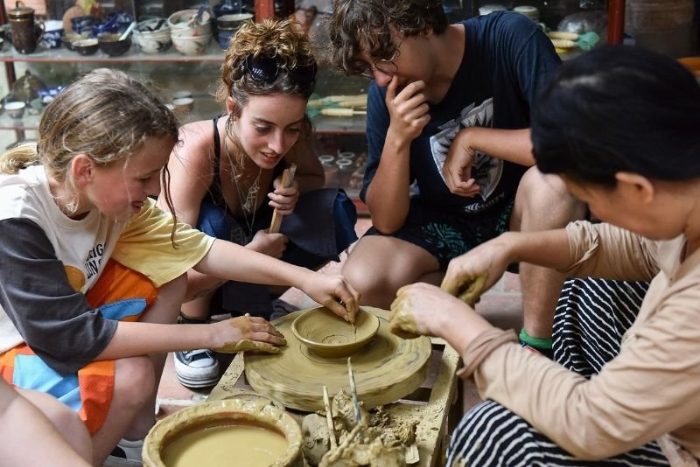
Later, in the village of Phu Cam, I learned to sew dried palm leaves to make a nón lá, the conical hat symbol of Vietnam, an ideal experience for those wondering what to do in Hue when it rains. The sound of the rain set the rhythm of the artisans’ gestures, softening the moment even more. And in the pottery village of Phuoc Tich, with my hands full of clay, I saw simple and magnificent objects being born before me. These encounters, these exchanges and these shared laughs over a hot tea remain for me one of the most beautiful memories of the rainy season in Hue.
6. Tasting the local specialties of Hue

Rainy days give Hue a special softness, and it is without doubt the ideal moment to discover the specialties in Hue. I found refuge in a small local restaurant, the windows covered with steam, the smell of the broth mixing with that of the wet earth. They served me a steaming bowl of bún bò Huế, spiced just enough, accompanied by lime and fresh herbs, then a tasty cơm hến, this rice scented with shellfish and garden herbs. With each spoonful, the warmth of the dish drove away the cold and awakened the senses. There was nothing simpler, nor more perfect, than savoring these imperial dishes while the rain set the rhythm outside.
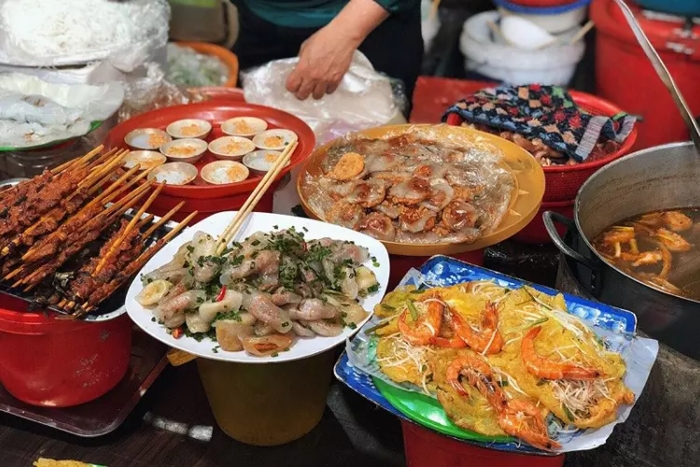
And one day as the city was still peppered with raindrops, I sampled several other Hue sweets — bánh bèo, bánh nậm, and bánh bột lọc, all soft and warm in their banana leaf wrappers — a gourmet recommendation for anyone seeking things to do in Hue in the rainy season. The refinement of their flavor and the softness of their texture bring to mind that of imperial cuisine. Sitting by the window, I was watching the water drops run down the window glass while steam from my food surrounded me. And if one’s heart is a little fragile, just a bowl of hot, sweet and fragrant chè can make one forget about the bleakness outside. It’s at this point that I stop and tell myself that the rain doesn’t make Hue dull — what it does is strip back the city so all its softness and poetry is laid bare.
III. Practical tips for a successful trip to Hue in the rainy season
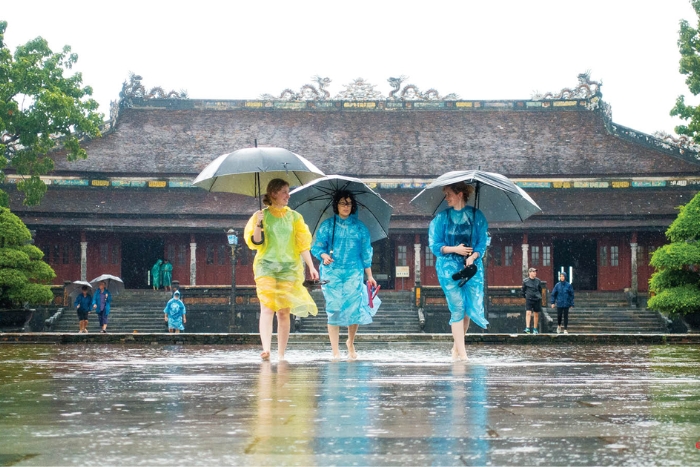
After a few days spent in Hue in the rainy season, I understood that only a few simple precautions are enough to turn the showers into travel allies. Here is what I would have liked to know before leaving:
- Check the weather before planning your day: In Hue, the rain can appear suddenly and then disappear just as quickly. By taking a look at the weather report in the morning, one can easily adjust one’s program, favor indoor visits and keep the walks for the lulls.
- Bring a solid umbrella and a waterproof jacket: Showers in Hue come without warning, sometimes light, sometimes more intense. A good umbrella and a light jacket will allow you to enjoy the city without rushing or taking shelter at every street corner.
- Take a light sweater for the evening: After the rain, the air becomes cooler, especially in the evening. A jacket or a light sweater is enough to walk comfortably in the calm streets of the old town.
- Favor trips by taxi or by car: The roads can be slippery after a shower. Traveling by taxi or with a local driver makes the trips safer and more pleasant.
- Keep smiling and enjoy the charm of the rain: In Hue, even grey days have their poetry. The rain softens the sounds, makes the old roofs shine and reveals a slower, more sincere city.
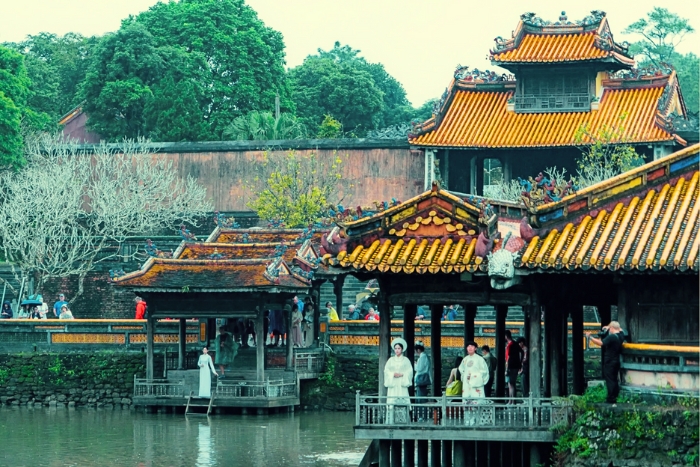
Leaving Hue, I told myself that the rain was never an obstacle, but an incentive to rediscover the city. Each shower offered me a unique experience: a quiet walk in the Citadel, a visit to the royal tombs in the mist, a Nhã nhạc performance drowned in the sound of the drops. The rainy season in Hue gives a very particular, almost melancholic depth, where everything is meant to move slowly, more authentically. If you are out of inspiration about what to do in Hue when it rains, do not search, let yourself be guided by the city and its emotions. With Autour Asia, a passionate local agency in Vietnam, experiencing Hue in the rain becomes a sincere, poetic and unforgettable experience — a journey that one keeps for a long time in the heart.
Read more:
- 5 days in Hue
- 6-day itinerary Hue Da Nang Hoi An
- 4 days Hue Dong Hoi itinerary
- Hue Travel Guide
- Tour Da Nang Hoi An Hue 5 days
- Central Vietnam Tours
Tour Hue Da Nang Hoi An in 5 days begins with your arrival in Hue, where you settle into your hotel and enjoy free time to relax. The second day is dedicated to exploring Hue’s imperial heritage, from the bustling Dong Ba Market to the Imperial City, followed by visits to the Tu Duc Royal Tomb, a conical hat and incense workshop, and the peaceful Tu Hieu Pagoda. On the third day, you travel from Hue to Hoi An via the scenic Hai Van Pass, stopping at the Cham Museum and the Marble Mountains before arriving in the lantern-lit town of Hoi An. The fourth day takes you into the countryside on a cycling and boat excursion, visiting Kim Bong carpentry village, mat-weaving families, Tra Nhieu village, and the coconut groves of Cam Thanh, where you enjoy lunch with a local resident. On the final day, you return to Da Nang for your departure, completing a perfectly balanced 5-day journey combining imperial history, cultural discovery, and rural life in central Vietnam.
To plan 6 days in Hue Da Nang Hoi An, the best is to start in Hue, the former imperial capital, to dive into the history of Vietnam through the Imperial City, the royal tombs and the Thien Mu Pagoda. Then, take the scenic Hai Van Pass to reach Da Nang, where you can enjoy My Khe Beach, the Cham Museum and the spectacular Golden Bridge at Ba Na Hills. End your trip in Hoi An, the city of lanterns, by strolling through its UNESCO-listed old town, joining a lantern-making workshop and discovering rural life in Tra Que village. This 6-day itinerary in Hue, Da Nang and Hoi An offers a perfect balance of culture, nature and relaxation, and can easily be customized with the help of Autour Asia, a local agency specialized in tailor-made trips in Vietnam.
During the rainy season, it is better to stay in the center of Hue, near the Citadel or the Perfume River, in order to reach the museums and cultural sites easily without getting too wet. Charming hotels as well as traditional homestays often offer covered areas and a warm atmosphere, perfect for listening to the falling rain while sipping a hot tea. If you are wondering what to do in Hue when it rains, choosing a well-located accommodation will allow you to fully enjoy indoor activities, such as Nhã nhạc performances, craft workshops or a tasting of local cuisine.
Related travel guide
Other similar articles
CUSTOMIZABLE BY LOCAL EXPERTS
Personalized trip at the original price!
REFUND GUARANTEE
We believe in our work and promise to give you money back.
GOOD PRICE / QUALITY
95% satisfied more than expected!
24/7 LOCAL SUPPORT
We are always available online to provide assistance at any time.
Most read articles
Autour Asia is highly recommended on
Embracing the mission of "Satisfied more than expected" and providing authentic experiences, we have received numerous recommendations on reputable travel forums:













